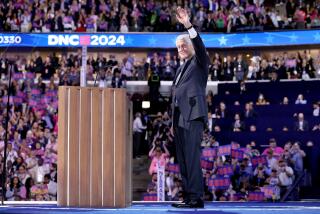Clinton Guns for Bush as His Rivals Fall Back : Campaign: The Arkansas governor pulls away from the pack with decisive Super Tuesday wins. His Chicago victory speech is jubilant.
- Share via
CHICAGO — A few minutes after 9 p.m. here Tuesday, Arkansas Gov. Bill Clinton was transformed, in his own mind if not quite in reality just yet, into the presumptive Democratic nominee.
He took to the stage at a downtown high-rise, embraced his wife, Hillary, and thundered his victory speech into the microphone to the cheers of a boisterous crowd.
He did not so much as mention his major competitor, former Massachusetts Sen. Paul E. Tsongas. Former California Gov. Edmund G. (Jerry) Brown Jr., the third of the remaining Democratic presidential candidates, merited not one reference.
Awash in good news from Florida to Texas and five other states, Clinton had his eyes and his rhetoric fixed sharply on President Bush, whom he hopes to meet in November’s general election.
“They are holding their weapons to divide us one more time; us against them,” he said of Bush’s Republican legions. “Them the Democrats, them the Congress, them the liberals, them the minorities. Folks, there is no ‘them’ in America, there is only us.”
As he left Little Rock for Chicago at midday Tuesday, Clinton had set an artificially low standard for what he would deem to be success on Super Tuesday, the biggest of the primary days.
“We have to win more than we lose,” he said.
But in truth, Tuesday’s broad run of Southern primaries had always been Clinton’s fire wall, the place where he hoped he could stop any other Democrat from building momentum. And the region delivered even better than this son of the South had imagined: Clinton won most of his seven states by whopping margins.
The themes Clinton chose to dwell upon Tuesday night can be expected to be struck repeatedly this week--as he seeks to continue his winning streak in Illinois and Michigan--and through to the general election, if he is indeed the nominee.
The Arkansas governor, whose candidacy had been declared dead and subsequently resurrected more times than he can count, made passing references to the controversies that have swirled around him in the last two months.
“The people in the South heard the worst about me, but they saw the best,” he declared, adding a bit defensively: “The true measure of character in politics can never be perfection, because if required, no one could pass.”
Clinton cast the broad net of his “opportunity and responsibility” theme over issues as diverse as welfare reform and labor policy. The latter, while not a priority in the Southern states, looms large as Clinton and the other candidates move into the industrial states.
Trying to appeal to labor without seeming to refute his “new ideas” theology that demands change from the country’s institutions, Clinton urged workers to rethink their goals.
“The workers of this country must still assume the responsibility to examine every work rule, every job classification, everything in every workplace in America that can lead to our becoming a high-performance, high-growth, high-opportunity society,” he said, delivering words that may not be welcome to more traditional labor groups.
He repeated his call for welfare reform, saying he would deliver medical care, education, training and child care to welfare recipients and then require that they get a job. He slammed Bush for his rhetorical criticism of the welfare system.
“You have had 12 years and you haven’t hit a lick at it,” he said.
For some weeks, Clinton has bridled when Tsongas and others suggested that he is a regional candidate, depending on popularity in the South but unable to translate it into other victories. But in recent days, as it became clear that the South would vault him a good distance toward the nomination, Clinton returned the region’s embrace.
More to Read
Get the L.A. Times Politics newsletter
Deeply reported insights into legislation, politics and policy from Sacramento, Washington and beyond. In your inbox twice per week.
You may occasionally receive promotional content from the Los Angeles Times.











